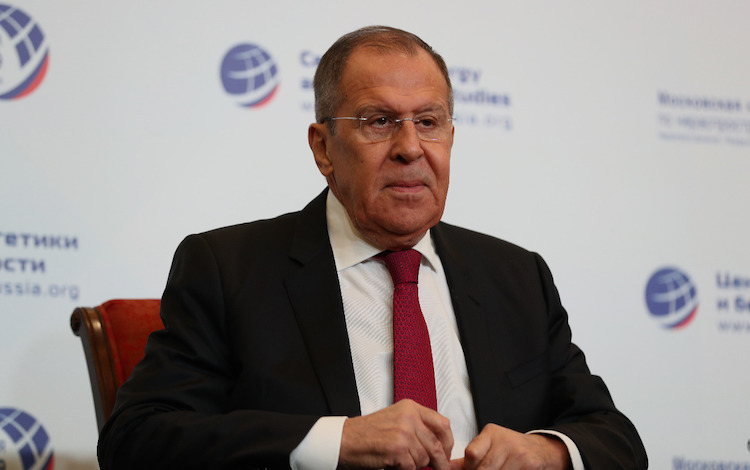By Kingston Reif and Shannon Bugos*

Photo: Russian Foreign Minister Sergey Lavrov addressing a nonproliferation conference in Moscow on 8 November 2019. Source: Russian Ministry of Foreign Affairs.
WASHINGTON, DC (IDN | Arms Control Association) – Top Russian Foreign Ministry officials have issued a fresh set of warnings about the future of the New Strategic Arms Reduction Treaty (New START) because, they say, the Trump administration continues to refuse to engage in talks on extending the treaty. [2019-11-15]
Washington “is evading any serious discussion, making public discouraging signals regarding the future of this treaty,” said Russian Foreign Minister Sergey Lavrov November 8 at a nonproliferation conference in Moscow.
Lavrov’s deputy, Sergey Ryabkov, voiced similar criticisms at the conference saying, “[It] looks as if the United States is dragging its feet, if not downright, looking for an excuse to get rid of New START right after tearing up the [Intermediate-Range Nuclear Forces] Treaty.”
The United States did not send an official representative to the conference.
The remarks from Lavrov and Ryabkov came a week after Vladimir Leontyev, deputy director of the Russian Foreign Ministry’s nonproliferation and arms control department, declared that there is not enough time to negotiate any replacement for New START before it expires in February 2021.
“It’s evident that given the time left, we won’t be able to draw up any full-fledged document to replace it,” said Leontyev at a meeting of the Valdai Discussion Club November 1.
Leontyev also warned that time could run out to secure an extension of the treaty. He said that Moscow would require “at least six months” in order to process a “technical extension.” Other foreign ministry officials have said that an extension would require the approval of the Russian Duma.
New START allows for an extension of up to five years (until 2026) if the presidents of the United States and Russia agree to do so.
As Russia emphasizes the importance of extending New START and indicated its readiness to begin talks on an extension, the Trump administration continues to talk about the need for a more ambitious arms control agreement with Russia and China but remains officially undecided about whether to extend New START.
During an October 22 interview with FOX News’ Sean Hannity, President Trump repeated the call for a trilateral agreement: “I believe that we’re going to get together with Russia and with China, and we’re going to work out our nuclear pact so that we don’t all continue with this craziness. We should all get together and work out something—a cap, have a cap. We don’t need 10,000 weapons.”
China has stated repeatedly that it is not interested in entering negotiations on a multilateral agreement. In order for those negotiations to become a real possibility, either “the U.S. agrees to reduce its arsenal to China’s level or agrees for China to raise its arsenal to the U.S. level,” said Fu Cong, director of the arms control department at China’s Foreign Ministry, at the Moscow conference. Currently, the United States has more than 6,000 total nuclear warheads, while China has about 300.
Lavrov said that “It’s an open provocation to insist on China’s participation in the [arms control] process, as a precondition, despite Beijing’s clearly stated and many times repeated position on this.”
Trump administration officials have additionally criticized New START for not covering the new long-range nuclear delivery systems that Russian President Vladimir Putin unveiled in a March 2018 speech.
However, Russia for the first time stated that two of the weapons—the Sarmat, a new intercontinental ballistic missile, and Avangard, a hypersonic glide vehicle—would count under the treaty.
“If Sarmat comes into existence at least as a prototype while the treaty is still valid, including in the extended period, there will be no problems from the point of view of the New START,” Leontyev said. “There should be no serious problems with Avangard, either.”
Leontyev added that there is no chance of including the three other new nuclear weapons systems—Kinzhal, an air-launched ballistic missile; Burevestnik (aka Skyfall), a globe-circling nuclear-powered cruise missile; and Poseidon, a nuclear-powered torpedo—without amending the treaty, in which case Moscow would have its own list of U.S. capabilities that should be addressed. He said that Russia was open to discussing these systems in the format of strategic stability talks.
The Kinzhal reportedly began trial deployment in December 2017. (Russia is currently planning to field the weapon on the shorter-range MiG-31 aircraft, in which case Kinzhal would not be accountable under New START.) Initial fielding of the Sarmat and Avangard could begin as soon as later this year and 2021, respectively. The Burevestnik, a recent test of which resulted in a deadly explosion, and Poseidon are still in development and unlikely to be deployed in larger numbers or before 2025, according to independent open source and intelligence assessments.
Moscow and Washington last held strategic stability talks in July. Leontyev said another round of discussions had been scheduled for November but had to be “postponed indefinitely” due to staff changes at the State Department.
Signed in 2010, New START caps the deployed U.S. and Russian strategic nuclear arsenals at 1,550 warheads, 700 missiles and heavy bombers, and 800 missile launchers and bombers.
* Kingston Reif, director for disarmament and threat reduction policy, and Shannon Bugos, research assistant. This article first appeared on 15 November in Arms Control Association blog. [IDN-InDepthNews – 15 November 2019]
Photo: Russian Foreign Minister Sergey Lavrov addressing a nonproliferation conference in Moscow on 8 November 2019. Source: Russian Ministry of Foreign Affairs.
IDN is flagship agency of the International Press Syndicate.
facebook.com/IDN.GoingDeeper – twitter.com/InDepthNews – twitter.com/nukeabolition






